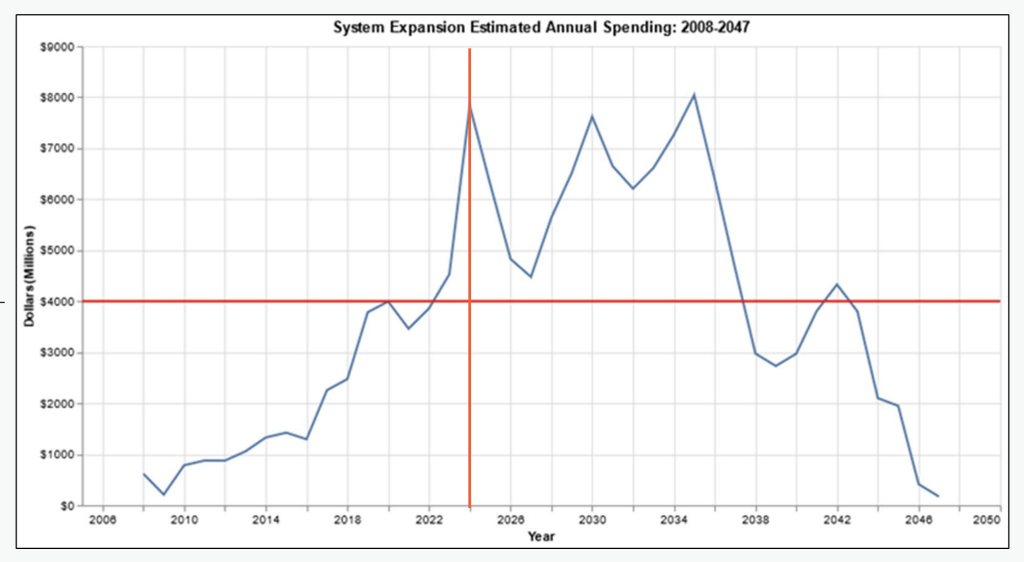
Sound Transit boardmembers heard from experts on the agency’s Technical Advisory Group (TAG) and their own independent consultant, Dave Peters, as part of a quarterly update last week. Albeit diplomatically, the group of experts chastised agency leadership and staff for what they considered a lack of urgency to implement sweeping recommendations to overhaul how Sound Transit manages its capital expansion programs.
In March, the TAG issued six recommendations to the agency and its board calling for major changes to structural systems and operating procedures. The TAG urged pushing decision-making to the lowest levels possible, improving procedures to eliminate delay, reforming the agency’s betterments policy, and enhancing relations with the Federal Transit Administration. But the two most important recommendations that the TAG issued centered on hiring an experienced executive team to manage the capital expansion programs, and rebuilding trust and clarifying roles among staff and board.
Last week, the TAG said that the agency wasn’t implementing their recommendations fast enough.
“Clearly we are down the road from where we thought we would be in October, November,” said Ken Johnsen, a TAG member. “When we presented our recommendations in March, we had in the report, a table that said we felt the organization should be able to implement those six recommendations in four to six months, and that meant, let’s say, by August, and we are in a situation where some of these are just getting started in the work program.”
Johnsen expressed particular disappointment in the lead megaproject expert hiring timeline set to stretch into spring or summer of next year. “It looks like that position is going to be filled well over a year from when we recommended it with a high degree of urgency to you,” he told the board.
The recommendations weren’t exactly new when March rolled around because the TAG actually previewed them in October 2022, five months earlier, to the System Expansion Committee.
In April, Sound Transit’s leadership team came forward to offer a first cut in how the agency would tackle the recommendations. Among those, outgoing CEO Julie Timm and Deputy CEO Brooke Belman (who is chief expansion delivery officer) outlined how the agency intended to address the executive team recommendation to manage the capital program.
Belman, a long-time staffer soon departing the agency, said that Sound Transit would hire just one megaproject expert with that person reporting to her and that the additional two roles called for by the TAG would be farmed out in contracts to consultants. Boardmembers at the meeting seemed to balk at that since the TAG had explicitly envisioned a two-tiered structure of megaproject experts in full control of the Sound Transit 2 and 3 capital programs, not reporting to another layer of bureaucracy.
“We had looked at that, and the board asked us to look at it, and we felt that the program — the way it was outlined — was not fully consistent with what we thought was needed in our TAG recommendations,” Johnsen said last week. “So at that meeting, the board unanimously passed a resolution that directed the staff to implement the TAG recommendations.”
Agency staff engagement with the TAG was fairly low between April and early fall, according to Johnsen. Most of the interactions during that time were around organizational structures and job descriptions for the megaproject experts. Despite numerous board meetings showing work plan progress on implementing the TAG recommendations, it wasn’t until mid-fall when staff approached the TAG to invite them to kick-off meetings for the TAG recommendations.
TAG members weren’t exactly enamored with the work plan that staff have developed.
“The work plans had 50 steps when they needed four steps,” Connie Crawford, another TAG member said. “We really want to see some quick hits. We want to see some success stories.”
Johnsen seemed to echo Crawford’s sentiment. “It called for things going out for a couple of years on one of them,” he said. “That’s not how this should be tackled.”
Instead, Johnsen emphasized the importance of decision-making over process to realize a culture of urgency.
“[Sound Transit] simply needs to have a culture of: get decision-making down where it needs to be, on how you deal with change orders, how you deal with monthly payments, how do you simplify it so you you’re an ‘owner of choice’,” Johnsen said. “To really do it, just cut, cut process out, not put process back in. And if we had a little bit of concern, if you will, on the work program, it is that there seems to maybe be the potential of adding more process and we’re trying to say, ‘no, less process, more decision-making’.”

Putting it all in perspective, the TAG pointed back to the big wave of capital spending Sound Transit is now imminently staring down as it moves forward on major Sound Transit 3 projects and wraps up Sound Transit 2 projects. Earlier this year, the wave was still coming, but it’s now here — with billions more in annual expenditures — which is why the TAG believes implementation of their collective set of recommendations is paramount.
“If you don’t spend that money, schedules are delayed,” Johnsen said. “If your schedules are delayed, costs go up.”
At the same meeting, the board’s own independent consultant, Dave Peters, agreed with the TAG.
“I still think there’s tremendous need for a culture of urgency,” Peters said. “Public agencies are bureaucratic, that’s just how they are; Sound Transit is no exception. It has a perpetual mission to provide mobility in the region.”
To cut through the bureaucracy, Peters said that the megaproject expert team could ultimately help “streamline the decision-making, to shorten the chain of command, to get people thinking hard about how do we do this better and faster, and get this done.”
That team, however, is still months away from taking the helm and now Sound Transit is set to see a lot of interim upheaval as top management — both Timm and Belman — exit the agency.
Stephen is a professional urban planner in Puget Sound with a passion for sustainable, livable, and diverse cities. He is especially interested in how policies, regulations, and programs can promote positive outcomes for communities. With stints in great cities like Bellingham and Cork, Stephen currently lives in Seattle. He primarily covers land use and transportation issues and has been with The Urbanist since 2014.

